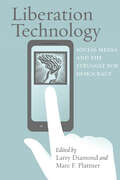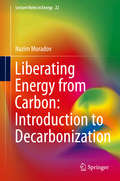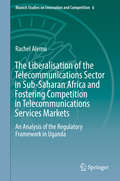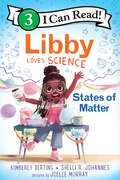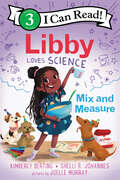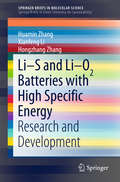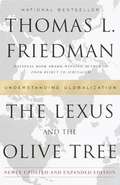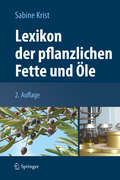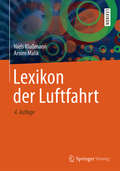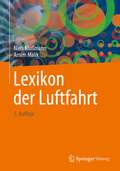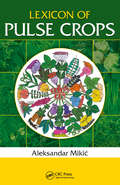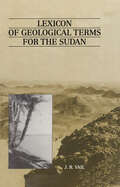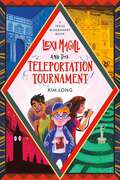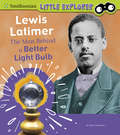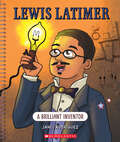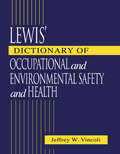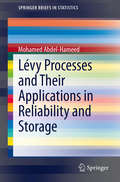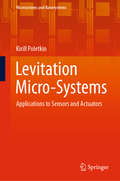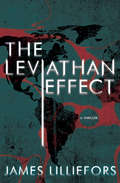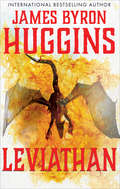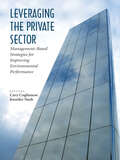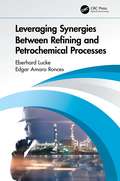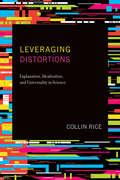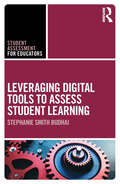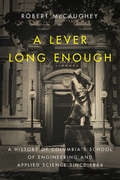- Table View
- List View
Liberation Technology: Social Media and the Struggle for Democracy (A Journal of Democracy Book)
by Larry Diamond and Marc F. PlattnerThe revolutions sweeping the Middle East provide dramatic evidence of the role that technology plays in mobilizing citizen protest and upending seemingly invulnerable authoritarian regimes. A grainy cell phone video of a Tunisian street vendor’s self-immolation helped spark the massive protests that toppled longtime ruler Zine El Abidine Ben Ali, and Egypt’s "Facebook revolution" forced the ruling regime out of power and into exile. While such "liberation technology" has been instrumental in freeing Egypt and Tunisia, other cases—such as China and Iran—demonstrate that it can be deployed just as effectively by authoritarian regimes seeking to control the Internet, stifle protest, and target dissenters. This two-sided dynamic has set off an intense technological race between "netizens" demanding freedom and authoritarians determined to retain their grip on power.Liberation Technology brings together cutting-edge scholarship from scholars and practitioners at the forefront of this burgeoning field of study. An introductory section defines the debate with a foundational piece on liberation technology and is then followed by essays discussing the popular dichotomy of "liberation" versus "control" with regard to the Internet and the sociopolitical dimensions of such controls. Additional chapters delve into the cases of individual countries: China, Egypt, Iran, and Tunisia.This book also includes in-depth analysis of specific technologies such as Ushahidi—a platform developed to document human-rights abuses in the wake of Kenya’s 2007 elections—and alkasir—a tool that has been used widely throughout the Middle East to circumvent cyber-censorship.Liberation Technology will prove an essential resource for all students seeking to understand the intersection of information and communications technology and the global struggle for democracy.Contributors: Walid Al-Saqaf, Daniel Calingaert, Ronald Deibert, Larry Diamond, Elham Gheytanchi, Philip N. Howard, Muzammil M. Hussain, Rebecca MacKinnon, Patrick Meier, Evgeny Morozov, Xiao Qiang, Rafal Rohozinski, Mehdi Yahyanejad
Liberating Energy from Carbon: Introduction to Decarbonization
by Nazim MuradovLiberating Energy from Carbon analyzes energy options in a carbon-constrained world. Major strategies and pathways to decarbonizing the carbon-intensive economy are laid out with a special emphasis on the prospects of achieving low-risk atmospheric CO2 levels. The opportunities and challenges in developing and bringing to market novel low and zero-carbon technologies are highlighted from technical, economic and environmental viewpoints. This book takes a unique approach by treating carbon in a holistic manner--tracking its complete transformation chain from fossil fuel sources to the unique properties of the CO2 molecule, to carbon capture and storage and finally, to CO2 industrial utilization and its conversion to value-added products and fuels. This concise but comprehensive sourcebook guides readers through recent scientific and technological developments as well as commercial projects that aim for the decarbonization of the fossil fuel-based economy and CO2 utilization that will play an increasingly important role in the near- and mid-term future. This book is intended for researchers, engineers, and students working and studying in practically all areas of energy technology and alternative energy sources and fuels.
The Liberalisation of the Telecommunications Sector in Sub-Saharan Africa and Fostering Competition in Telecommunications Services Markets
by Rachel AlemuThis study investigates whether the existing regulatory framework governing the telecommunications sector in countries in Sub-Saharan Africa effectively deals with emerging competition-related concerns in the liberalised sector. Using Uganda as a case study, it analyses the relevant provisions of the law governing competition in the telecommunications sector, and presents three key findings: Firstly, while there is comprehensive legislation on interconnection and spectrum management, inefficient enforcement of the legislation has perpetuated concerns surrounding spectrum scarcity and interconnection. Secondly, the legislative framework governing anti-competitive behaviour, though in line with the established principles of competition law, is not sufficient. Specifically, the framework is not equipped to govern the conduct of multinational telecommunications groups that have a strong presence in the telecommunications sector. Major factors hampering efficient competition regulation include Uganda's sole reliance on sector-specific competition rules, restricted available remedies, and a regulator with limited experience of enforcing competition legislation. The weaknesses in the framework strongly suggest the need to adopt an economy-wide competition law. Lastly, wireless technology is the main means through which the population in Uganda accesses telecommunications services. Greater emphasis should be placed on regulating conduct in the wireless communications markets.
Libby Loves Science: States of Matter (I Can Read Level 3)
by Kimberly Derting Shelli R. JohannesLibby loves science! In this STEM-themed Level 3 I Can Read! title, Libby and her friends learn about solids, liquids, and gases. A great choice for aspiring scientists, new readers, and fans of Andrea Beaty’s Ada Twist, Scientist. Includes activities, a glossary, and a fun science experiment to do at home.Libby loves science—and experimenting! In this Level 3 I Can Read! title, Libby and her classmates are excited to welcome a new student into their classroom. When the ice cream for the welcome party melts, Libby is curious to see how the three states of matter can save the celebration. Experiment with Libby and find out!The Loves Science books introduce readers to girls who love science, as well as basic concepts of science, technology, engineering, and math. This Level 3 I Can Read! explores how solids, liquids, and gases are all around us, and includes two experiments to try at home or school, as well as a glossary. A great pick for newly independent readers and an ideal companion to Cece Loves Science: Push and Pull, Libby Loves Science: Mix and Measure, Vivi Loves Science: Sink or Float, and Vivi Loves Science: Wind and Water.
Libby Loves Science: Mix and Measure (I Can Read Level 3)
by Kimberly Derting Shelli R. JohannesLibby loves science! In this STEM-themed Level 3 I Can Read! title, Libby and her friend Rosa learn about mixing and measuring to bake a delicious treat for a puppy party. A great choice for aspiring scientists, emerging readers, and fans of Andrea Beaty’s Ada Twist, Scientist. Includes activities, a glossary, and a cupcake recipe. Libby loves science—and experimenting! In this Level 3 I Can Read! title, Libby hosts a puppy party for her friends and their dogs. With the help of her friend Rosa and little brother, Libby decorates, stuffs goody bags and bakes delicious cupcakes. But when they realize they’ve forgotten an important ingredient, they use science to solve the problem—just in the nick of time. The Loves Science books introduce readers to girls who love science, as well as basic concepts of science, technology, engineering, and math. This Level 3 I Can Read! focuses on basic chemistry and friendship. A great pick for newly independent readers and an ideal companion to Cece Loves Science: Push and Pull.
Li-S and Li-O2 Batteries with High Specific Energy
by Huamin Zhang Xianfeng Li Hongzhang ZhangThis brief reviews the functions, recent developments, challenges and prospects of the Li/S and Li/O2 batteries, including the fundamental knowledge, research status, potential applications etc. It starts with a brief overview and encompasses the current state of Li/S and Li/O2 battery technology. Then it provides the basic knowledge about Li/S and Li/O2 batteries, including the electrochemical processes and the battery components. The following chapters focus on the historical and recent development of the Li/S and Li/O2 batteries respectively, giving detailed information about the key materials development, cell assembly, testing diagnosis and degradation mechanism. Finally, the main potential applications of Li/S and Li/O2 batteries together with their challenge and perspectives are discussed.
The Lexus and the Olive Tree: Understanding Globalization
by Thomas L. FriedmanFrom one of our most perceptive commentators and winner of the National Book Award, a comprehensive look at the new world of globalization, the international system that, more than anything else, is shaping world affairs today. As the Foreign Affairs columnist for The New York Times, Thomas L. Friedman has traveled the globe, interviewing people from all walks of contemporary life: Brazilian peasants in the Amazon rain forest, new entrepreneurs in Indonesia, Islamic students in Teheran, and the financial wizards on Wall Street and in Silicon Valley. Now Friedman has drawn on his years on the road to produce an engrossing and original look at globalization. Globalization, he argues, is not just a phenomenon and not just a passing trend. It is the international system that replaced the Cold War system; the new, well-greased, interconnected system: Globalization is the integration of capital, technology, and information across national borders, in a way that is creating a single global market and, to some degree, a global village. Simply put, one can't possibly understand the morning news or one's own investments without some grasp of the system. Just one example: During the Cold War, we reached for the hot line between the White House and the Kremlin--a symbol that we were all divided but at least the two superpowers were in charge. In the era of globalization, we reach for the Internet--a symbol that we are all connected but nobody is totally in charge. With vivid stories and a set of original terms and concepts, Friedman offers readers remarkable access to his unique understanding of this new world order, and shows us how to see this new system. He dramatizes the conflict of "the Lexus and the olive tree"--the tension between the globalization system and ancient forces of culture, geography, tradition, and community. He also details the powerful backlash that globalization produces among those who feel brutalized by it, and he spells out what we all need to do to keep the system in balance. Finding the proper balance between the Lexus and the olive tree is the great drama of he globalization era, and the ultimate theme of Friedman's challenging, provocative book--essential reading for all who care about how the world really works.
Lexikon der pflanzlichen Fette und Öle
by Sabine KristAus naturwissenschaftlicher Sicht stellen die Autoren 135 bekannte und exotische Pflanzenöle, Wachse und pflanzliche Fette systematisch dar - darunter Kiwisamen-, Tomatenkern- und Ootangaöl. Besonderes Augenmerk gilt den Stammpflanzen, der Gewinnung, den Inhaltsstoffen sowie der ernährungsphysiologischen Zusammensetzung. Anwendungsmöglichkeiten in Medizin, Pharmazie, Kosmetik und Technik sowie mögliche Nebenwirkungen werden diskutiert. In die Neuauflage des Lexikons wurden 40 weitere Fette und Öle aufgenommen.
Lexikon der Luftfahrt
by Niels Klußmann Arnim MalikDas Lexikon bietet als zuverlässiges Kompendium zur Luftfahrt sorgfältig ausgearbeitete Einträge zu Themenfeldern wie Flugzeugbau, Flugwetter, Luftrecht, Flugsicherheit sowie Fluglinien- und Flughafenbetrieb. Die Stichwörter geben Auskunft über Zusammenhänge innerhalb der Aviatik aus technischer, organisatorischer, kommerzieller und historischer Sicht. Mit Angaben zu zahlreichen Internet-Adressen wird auf weitere Recherchemöglichkeiten hingewiesen. Für die 3. Auflage des Buchs wurden 2.500 Einträge aktualisiert und neu hinzugefügt.
Lexikon der Luftfahrt
by Niels Klußmann Arnim MalikDas faktenreiche Lexikon ist ein zuverlässiges Kompendium für alle, die sich mit der Fliegerei und den angrenzenden Bereichen der Luftfahrt beschäftigen. Für Ingenieure, Piloten und Mitarbeiter von Fluggesellschaften ist dieses Werk ebenso informativ wie für ambitionierte Luftfahrtinteressierte. Die vierte Auflage des Buches enthält aktuelle Lexikoneinträge, deren Umfang wieder deutlich erweitert wurde. Zu vielen Bereichen der Luftfahrt, wie Flugzeugbau, Flugwetter, Luftrecht, Flugsicherheit sowie Fluglinien- und Flughafenbetrieb, kann der Leser sorgfältig ausgearbeitete Artikel finden. Sie geben Auskunft über Zusammenhänge innerhalb der Aviatik aus technischer, organisatorischer, kommerzieller und historischer Sicht. Zahlreiche Internet-Adressen eröffnen die Möglichkeit zur weiteren Recherche.
Lexicon of Pulse Crops
by Aleksandar MikićLexicon of Pulse Crops integrates botanical and linguistic data to analyze and interpret the grain legume significance from the earliest archaeological and written records until the present day. Aimed at both agronomic and linguistic research communities, this book presents a database containing 9,500 common names in more than 900 languages and dialects of all ethnolinguistic families, denoting more than 1,100 botanical taxa of 14 selected pulse crop genera and species. The book begins with overviews of the world’s economically most important grain legume crops and their uncultivated relatives, as well as the world’s language families with their inner structure, including both extinct and living members. The main section of the text presents 14 specialized book chapters covering Arachis, Cajanus, Cicer, Ervum, Faba, Glycine, Lablab, Lathyrus, Lens, Lupinus, Phaseolus, Pisum, Vicia, and Vigna. They provide the reader with extensive lists of the botanically accepted species and subtaxa and surveys lexicological abundance in all world’s ethnolinguistic families, comprising extinct and living as well as natural and constructed languages, while the vernacular names for the most significant taxa are presented in comprehensive tables. Each of these chapters also presents the existing etymologies and novel approaches to deciphering the origins of common names, accompanied by one original color plate depicting possible root evolutions in the form of corresponding pulse crop plants.
Lexicon of Geological Terms for the Sudan
by J.R. VailA listing of lithostratigraphic terms used by geologists in the Sudan. Including 315 rock unit names with location, age, and description. Useful for correlation with adjacent areas of North Africa.
Lexi Magill and the Teleportation Tournament
by Kim LongFor fans of The Amazing Race, Lexi Magill and the Teleportation Tournament is the perfect adventure for middle grade readers who like scavenger hunts and puzzle-solving.Twelve-year-old physics whiz Lexi Magill won't let anything stop her from winning Wisconsin's Teleportation Tournament--the annual competition where teams teleport around the world to solve science-based puzzles. She needs the prize money if she wants to re-enroll in the science academy her parents can no longer afford. Added bonus: she'll be able to reconnect with her best friend Haley.But Lexi's two teammates put a wrench in her plans. When one misreads a clue that lands the team in a castle in Germany, and the other loses her teleportation medallion in Poland, Lexi wonders what she's gotten herself into. Struggling to keep her team under control as the race rages on, Lexi not only has to figure out how to get back on course (literally), but she must decide how far she's willing to go to win, and who her real friends are. With riddles to solve and messages to decode, this interactive read won't disappoint!
Lewis Latimer: The Man Behind a Better Light Bulb (Little Inventor)
by Nancy DickmannWhy is Lewis Latimer important? His invention of the carbon filament made light bulbs more afforable and longer lasting. Readers follow his journey from working with Alexander Graham Bell to improving Thomas Edison's light bulb. It's an enlightening story filled with engaging text and colorful images, all reviewed by Smithsonian experts.
Lewis Latimer: A Brilliant Inventor (Bright Minds)
by Janel RodriguezMeet the inventors and scientists of color who changed the world!Born in Chelsea, Massachusetts, in 1848, Lewis Latimer was an inventor, a leader, a teacher, and a creator. He knew how to draw, knew the law, wrote books and poetry, and spoke several languages. Among his many accomplishments, he contributed to the design of the light bulb, and brought the electric light to cities around the world. It is time to remember how Lewis Latimer's inventions and his contributions changed our society… and our world!ABOUT THIS SERIES:Many inventors and scientists of color have made incredible contributions to our modern life. Each volume in this much-needed new series will be devoted to the life and work of one of these inventors and scientists. With a vivid writing style that will use humor as one of its primary ingredients, and illustrated with a combination of real photos and pictures featuring graphic art, each title in this series will describe how these heroes of diverse backgrounds faced the challenges of their times, and how their inventions and contributions changed our society.
Lewis' Dictionary of Occupational and Environmental Safety and Health
by Jeffrey Wayne VincoliWith definitions from areas such as toxicology, industrial hygiene, environmental compliance, environmental engineering, and occupational medicine the Lewis Dictionary of Occupational and Environmental Safety and Health contains THE MOST definitions for the words, related phrases, and terms encountered in these fields. It also includes a comprehens
Lévy Processes and Their Applications in Reliability and Storage
by Mohamed Abdel-HameedThis book covers Lévy processes and their applications in the contexts of reliability and storage. Special attention is paid to life distributions and the maintenance of devices subject to degradation; estimating the parameters of the degradation process is also discussed, as is the maintenance of dams subject to Lévy input.
Levitation Micro-Systems: Applications to Sensors and Actuators (Microsystems and Nanosystems)
by Kirill PoletkinThis book presents inductive and hybrid levitation micro-systems and their applications in micro-sensors and –actuators. It proposes and discusses analytical and quasi-finite element techniques for modeling levitation micro-systems based on the Lagrangian formalism. In particular, micro-bearings, -actuators, -accelerators and –accelerometers based on inductive levitation are comprehensively described with accompanying experimental measurements.
The Leviathan Effect: A Thriller (A\mallory Brothers Thriller Ser.)
by James LillieforsHomeland Security Secretary Catherine Blaine receives a frightening communication from a hacker identified only by the pseudonym "Janus": three recent natural disasters around the world were correctly predicted--in fact, they were manufactured, not natural at all. And, says the email, unless she does exactly as Janus instructs, more disasters are coming--and they will destroy the United States. Unaware of the crisis in Washington, investigative journalist Jon Mallory stumbles on a list of seven prominent scientists who have been murdered in recent months. When the person who had given him the list goes missing herself, Jon realizes he has unwittingly become part of a deadly chain of events. He contacts his brother, ex-CIA agent Charles, looking for help. Meanwhile, Catherine Blaine has also come to Charles for help to track down the hacker Janus and learn what frightening science is threatening the world.
Leviathan
by James Byron HugginsWith the creation of an unholy beast comes the end of the world in this diabolical thriller from the international bestselling author of Crux and Hunter. On an Icelandic Island, an illegal experiment intended to create the perfect biological weapon has transformed a once-innocent creature into the biblical Leviathan that once terrorized the world. Able to shatter steel and granite as easily as it can melt the strongest containment shields, Leviathan escapes from its pen and is loose in a vast underground chamber harboring soldiers and scientists. The installation cannot allow Leviathan to reach the surface. For if Leviathan reaches the world, it could well be the end of the Earth. They must hold the line, here, and destroy it . . . even if they must detonate a last-chance nuclear failsafe built into the chamber itself. But, first, they must fight with every weapon at their disposal to discover if the beast can be killed at all. It is a battle many will not survive. As soldiers and scientists are vaporized by Leviathan&’s hellish flame, or ripped apart by the dragon&’s claws and fangs, a lone electrical engineer is forced to join the fight. And in the midst of what might well be the last battle for Mankind, Connor must find a way—any way—to save his family and kill this powerful, bloodthirsty Beast of Legend that has never been killed before. Before it feasts upon the world.Praise for James Byron Huggins &“Huggins writes like a man possessed.&”—Steve Jackson, New York Times bestselling author &“May be the thriller of the year.&”—BookPage on Cain &“Pure entertainment.&”—Publishers Weekly on Hunter
Leveraging the Private Sector: Management-Based Strategies for Improving Environmental Performance
by Cary Coglianese Jennifer NashLeveraging the Private Sector offers the first sustained analysis of public and private sector initiatives designed to encourage firms and industries to use their own management expertise to improve their environmental performance. Cary Coglianese and Jennifer Nash bring together original empirical studies by the nation?s leading experts on recent public and private sector experiments. Do management-based strategies lead to improved environmental outcomes? What kinds of strategies hold the most promise? Leveraging the Private Sector addresses these questions through studies of state pollution prevention planning laws, private sector purchasing requirements, and federal risk management regulations, among others. The contributors show that efforts to leverage private sector experience and knowledge can have a distinctive contribution in the future of environmental protection. Ultimately, a firm's broader management practices shape its environmental performance. Public and private sector strategies that seek to influence these practices directly can help bring about further environmental improvements. This book breaks new ground by investigating a new and promising approach for advancing the economy and the environment.
Leveraging Synergies Between Refining and Petrochemical Processes
by Eberhard Lucke Edgar Amaro RoncesLeveraging Synergies Between Refining and Petrochemical Processes provides a detailed description of the interfaces and connections between crude oil refining and petrochemicals. It offers a view of global and regional markets and economic opportunities for synergies between these sectors. Features: Shows a global and regional market outlook for crude oil refining and petrochemical sectors Explores economic and market opportunities for taking advantage of the synergies between both sectors Analyzes the technical challenges and opportunities that come with these synergies Gives an outlook and prediction of what companies will be able to achieve in the mid-term future Provides introductory and explanatory material as well as in-depth insight into future technology and market developments This book serves as a reference for professionals in chemical engineering, oil and gas engineering, and industrial chemistry. It aims to help engineers and industry professionals understand the challenges and the potential benefits of developing expansion or optimization projects that may bridge the gap between refining and petrochemicals.
Leveraging Distortions: Explanation, Idealization, and Universality in Science
by Collin RiceAn examination of how scientists deliberately and justifiably use pervasive distortions of relevant features to explain and understand natural phenomena.A fundamental rule of logic is that in order for an argument to provide good reasons for its conclusion, the premises of the argument must be true. In this book, Collin Rice shows how the practice of science repeatedly, pervasively, and deliberately violates this principle. Rice argues that scientists strategically use distortions that misrepresent relevant features of natural phenomena in order to explain and understand--and that they use these distortions deliberately and justifiably in order to discover truths that would be otherwise inaccessible. Countering the standard emphasis on causation, accurate representation, and decomposition of science into its accurate and inaccurate parts, Rice shows that science's epistemic achievements can still be factive despite their being produced through the use of holistically distorted scientific representations. Indeed, he argues, this distortion is one of the most widely employed and fruitful tools used in scientific theorizing. Marshalling a range of case studies, Rice contends that many explanations in science are noncausal, and he presents an alternate view of explanation that captures the variety of noncausal explanations found across the sciences. He proposes an alternative holistic distortion view of idealized models, connecting it to physicists' concept of a universality class; shows how universality classes can overcome some of the challenges of multiscale modeling; and offers accounts of explanation, idealization, modeling, and understanding.
Leveraging Digital Tools to Assess Student Learning (Student Assessment for Educators)
by Stephanie Smith BudhaiLeveraging Digital Tools to Assess Student Learning provides a practical approach to using technology to collect, interpret, and curate assessment data in K-12 in-person, online, hybrid, and dual learning environments. Digital media, emerging learning technologies, and handheld devices play larger roles than ever in students’ 21st-century educational experiences. Digital tools, meanwhile, can also transform assessment practices for teachers, allowing more efficient means of identifying gaps and modifying instruction to maximize student learning. Situating assessment practices in today’s networked, flexible, and virtual classrooms, this book reframes polling and quizzing, social media and memes, and multimedia platforms as digital learning tools for engaging, interactive, and meaningful formative, summative, open-ended, peer and self-paced assessments. The final chapter discusses technology’s role in organizing, evaluating, and disseminating assessment data to students, their families, and administrators.
A Lever Long Enough: A History of Columbia's School of Engineering and Applied Science Since 1864 (Columbiana)
by Robert McCaugheyIn this comprehensive social history of Columbia University's School of Engineering and Applied Science (SEAS), Robert McCaughey combines archival research with oral testimony and contemporary interviews to build a critical and celebratory portrait of one of the oldest engineering schools in the United States. McCaughey follows the evolving, occasionally rocky, and now integrated relationship between SEAS's engineers and the rest of the Columbia University student body, faculty, and administration. He also revisits the interaction between the SEAS staff and the inhabitants and institutions of the City of New York, where the school has resided since its founding in 1864. McCaughey compares the historical struggles and achievements of the school's engineers with their present-day battles and accomplishments, and he contrasts their teaching and research approaches with those of their peers at other free-standing and Ivy League engineering schools. What begins as a localized history of a school striving to define itself within a university known for its strengths in the humanities and the social sciences becomes a wider story of the transformation of the applied sciences into a critical component of American technology and education.
